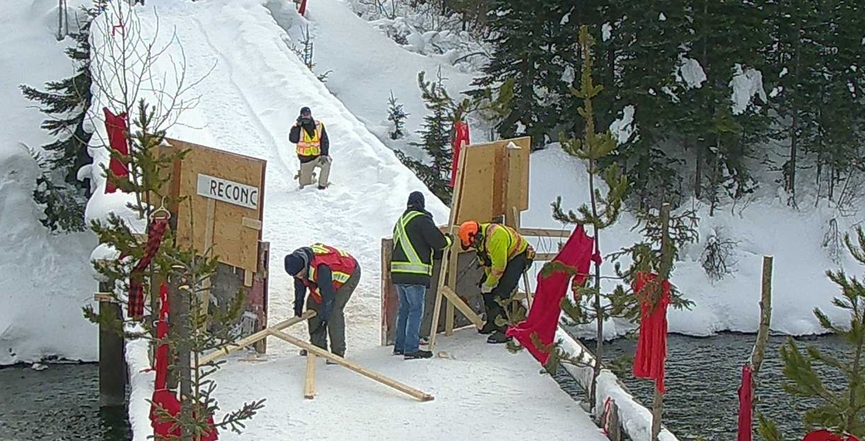Dozens of effective actions in solidarity with the Wet’suwet’en land protectors are taking place from Prince Edward Island to Victoria, B.C. This was not the kind of display of national unity the Trudeau government was looking for.
The Liberals’ “talking points” approach to government was to pretend that the RCMP occupation of Wet’suwet’en land was a provincial issue.
As environmentalists join forces with Indigenous peoples protecting their land from environmental damage, and Canadians take to the streets, blockade rail routes and occupy government offices, Justin Trudeau’s cabinet has no idea what to do.
The Trudeau government had a “reconciliation” agenda that omitted claims to Aboriginal land title legitimized by court decisions, the 1996 Royal Commission on Aboriginal Peoples and the United Nations Declaration on the Rights of Indigenous Peoples.
Trudeau offered a carbon rebate as a sop to climate justice proponents while, according to IMF estimates, Canadian governments subsidize the expansion of oil and gas projects to the tune of $60 billion a year.
In B.C., John Horgan’s NDP took power with a strategy: stay in office by denying the Liberal opposition any issues that upset the corporate world.
The NDP’s rhetoric of solidarity with Indigenous peoples has become farcical as the RCMP occupy Wet’suwet’en land to push a Coastal GasLink pipeline route.
Irrefutable arguments on behalf of the Wet’suwet’en land protectors have been laid out in a series of Supreme Court of Canada (SCC) decisions acknowledging the existence of unextinguished Aboriginal title as a part of Canadian law.
The 1997 Delgamuukw case, brought by the Wet’suwet’en, identified ancestral rights — established over many centuries — to Aboriginal title, with specific territorial rights to be negotiated (or litigated) with the various provinces that hold “Crown land.”
Aboriginal title means that rights to dispose of Crown land — asserted by B.C. since it was established in 1858 as a colony — are circumscribed by Section 35 of the 1982 Constitution Act which protects Aboriginal rights.
The 2014 SCC Tsilhqot’in Nation v. British Columbia case applied the framework laid out in Delgamuukw to a specific territory. In her judgment on behalf of the court majority, Chief Justice McLachlin set out clear tests for governments negotiating Aboriginal title. These were applied, and Tsilhqot’in Nation occupancy rights to more than 1,500 square kilometres were recognized by the SCC.
The Coastal GasLInk pipeline being built across ancestral Wet’suwet’en territory failed to abide by a clear SCC directive laid out by McLachlin in 2014.
The B.C. government had to negotiate claims by hereditary chiefs to Aboriginal title before granting Coastal GasLink the right to connect its fracked gas over Aboriginal territory to a (foreign-owned) LNG Canada plant at the Port of Kitimat.
Instead, the B.C. government left negotiations up to Coastal GasLink, which chose to sign benefit agreements with band chiefs, ignoring the SCC identification of hereditary chiefs as the custodians of Aboriginal title.
In order to remain within their legal obligations under Section 35 of the Constitution Act, and carry out their fiduciary duty to Aboriginals, the B.C. government needed, in McLaughlin’s words, to define “a compelling and substantial objective” and ensure that “the benefits that may be expected to flow from that goal must not be outweighed by adverse effects on the Aboriginal interest.”
Given that the Canadian Energy Research Institute estimates the costs of production of Canadian LNG are about US$10 per million British thermal units (BTUs), which is more than double current sales prices in the projected Asian market, there are no economic benefits in sight for this $6-billion pipeline and $40-billion LNG project.
By definition, the Coastal GasLink fails the SCC “adverse benefits” test since its environmental costs are certainly greater than its zero economic benefits.
What the B.C. New Democrats and Ottawa Liberals need to recognize and act upon is that the price of LNG in Asian markets has plummeted from the US$18 per million BTUs when the pipeline through Wet’suwet’en land was conceived, to about US$4 per million BTUs today, eliminating any profit opportunities now and for the foreseeable future.
Extensive over-capacity already exists in competitive LNG-exporting countries such as the U.S. and Australia, which are already active in the markets the B.C. LNG project is supposed to service.
Without the extensive tax breaks, direct subsidies, infrastructure and police support granted to Coastal GasLink, and LNG Canada, no company in its right mind would consider continuing with a project where potential revenues are about one-half of actual costs.
By criminalizing the Wet’suwet’en land defenders, the RCMP, the B.C. government and Ottawa are willfully flouting the law of Canada, a law that includes pre-existing Aboriginal rights to title as the SCC has indicated in multiple judgments. And, those governments are contravening Aboriginal rights guaranteed under the Section 35 of the Constitution Act — for a project that makes no economic sense whatsoever.
Duncan Cameron is president emeritus of rabble.ca and writes a weekly column on politics and current affairs.
Image: Unist’ot’en Camp/Twitter
Editor’s note, February 18, 2020: An earlier version of this story misspelled the last name of the former chief justice of the Supreme Court of Canada. She is Beverley McLachlin, not McLaughlin.




